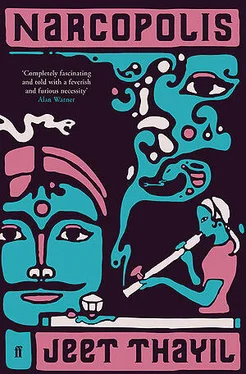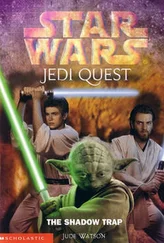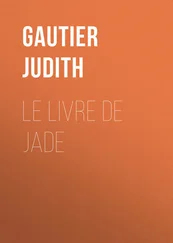Jeet Thayil - Narcopolis
Здесь есть возможность читать онлайн «Jeet Thayil - Narcopolis» весь текст электронной книги совершенно бесплатно (целиком полную версию без сокращений). В некоторых случаях можно слушать аудио, скачать через торрент в формате fb2 и присутствует краткое содержание. Год выпуска: 2012, Издательство: Faber & Faber, Жанр: Современная проза, на итальянском языке. Описание произведения, (предисловие) а так же отзывы посетителей доступны на портале библиотеки ЛибКат.
- Название:Narcopolis
- Автор:
- Издательство:Faber & Faber
- Жанр:
- Год:2012
- ISBN:нет данных
- Рейтинг книги:3 / 5. Голосов: 1
-
Избранное:Добавить в избранное
- Отзывы:
-
Ваша оценка:
- 60
- 1
- 2
- 3
- 4
- 5
Narcopolis: краткое содержание, описание и аннотация
Предлагаем к чтению аннотацию, описание, краткое содержание или предисловие (зависит от того, что написал сам автор книги «Narcopolis»). Если вы не нашли необходимую информацию о книге — напишите в комментариях, мы постараемся отыскать её.
Outside, stray dogs lope in packs. Street vendors hustle. Hookers call for custom through the bars of their cages as their pimps slouch in doorways in the half-light. There is an underworld whisper of a new terror: the Pathar Maar, the stone killer, whose victims are the nameless, invisible poor. There are too many of them to count in this broken city.
Narcopolis
Narcopolis — читать онлайн бесплатно полную книгу (весь текст) целиком
Ниже представлен текст книги, разбитый по страницам. Система сохранения места последней прочитанной страницы, позволяет с удобством читать онлайн бесплатно книгу «Narcopolis», без необходимости каждый раз заново искать на чём Вы остановились. Поставьте закладку, и сможете в любой момент перейти на страницу, на которой закончили чтение.
Интервал:
Закладка:
*
He said he’d teach her the important things, starting with the most important thing of all, the correct way to make tea and rice, so the tea wasn’t overbrewed and the rice wasn’t overcooked. He said: You want make food forget Indian way. Indian’s system is like American system, everything overdone. They have no subtle. He sent her to buy octopus. She brought the tentacles home in a bag of ice and cut them into thin slices, at a sharp angle. She put the sliced octopus in a saucepan with ginger and green onions and added a black bean paste. He told her to touch the octopus to the flame and serve. But she let the dish cook for a good five minutes until the flesh was tough and rubbery. You overdid, he told her. Old Chinese saying, you don’t need take off your pant to fart. This is how he talks, she thought. He makes pronouncements, as if each thing he says is the final word on the subject. He talks in proverbs. There’s nothing I can say in reply.
Lee taught her how to make pipes because he was finding it difficult to do even this. Soon he would become a feeble old man and he’d need help to eat and shit. He would end up in a hospital, he said, at the mercy of Indians. He wanted to pass on his expertise, such as it was, while he was still able. He told her the most important thing was to take your time; that the making of the pipe should take longer than the smoking of it; that hurry went against the meaning of opium. ‘Patience,’ he said. ‘Be patient. You not patient, you no good.’ He taught her posture, how to recline so her head was at the same height as her right shoulder. He told her to close her eyes for a few minutes before she picked up the pipe and to bow to the lamp when she lit it first thing in the morning. She thought: Only, this is a chandu khana and we are smoking opium. We’re not praying, we’re getting high. But she followed his instructions and began the day with a few minutes of silence, the pipe resting across her lap.
He taught her some Chinese. Ho leng ah, and ha tho, so she could haggle with the vendors at the Chinese shop where she went to buy vegetables and fish. She told him that the Hindi for how much, kitna, sounded a little like the Cantonese, kay dow cheen ah, especially if you said it fast. It made him angry. There was no similarity between the two languages, he said, none at all. She was being stupid.
He taught her how to curse, comprehensive terms of abuse that wished disaster on descendants and forefathers alike, phrases as thorough and devastating as Chinese martial arts. ‘Repeat after me,’ he said, enunciating the words very slowly and much too loud. ‘Dew lay low mow chow hai siu fun hum ka chaan.’ He taught her the intonation, the staccato monosyllables, the plosives that detonated in the mouth. He taught her the proper pronunciation of dew, the Cantonese for fuck, telling her to stretch the vowel. He encouraged her to employ variations.
‘Enjoy sound of word. Is only way to say correctly.’
And he repeated the phrase, chanted it, because he was having such a good time with this.
‘One question,’ Dimple said.
Mr Lee took a cigarette out of a pack and considered it. He was rationing himself, taking his time instead of lighting up right away. They heard muffled explosions, four in a row, and he froze, then half a dozen louder bangs went off.
He lit up and said, ‘Nothing, only firecracker for their festival. Indian are crazy.’
They were in the courtyard, sitting in the sunshine, Dimple wearing Mr Lee’s straw gardening hat. She was protecting her complexion , a phrase she’d learned from Stardust magazine. Mr Lee put his cigarette out to cough. He spoke around his hack: ‘Wha-a-at question?’
‘Why am I learning to swear in Cantonese? Who will I swear at in Bombay? Nobody will understand.’
‘Best. If they don’t understand, you can curse as much you want, like I use to.’
He’s taking his leave, she thought. He’s absenting himself.
Book Two The Story of the Pipe
Chapter One In Spain with Mr Lee
He’s absenting himself in stages. He’s making it easier for me, she thought. He’s teaching me how to be alone. His cough had become constant. The smoke made it better, but only for a time. He spent entire days in his bunk, dreaming and coughing. She heard the scrape in his throat, a private, deeply intimate sound, and it embarrassed her. She heard the bray of it and it reminded her of the people she knew, all of whom carried the sound deep in their chests, from where it would someday emerge. She shook her head to dislodge it but the cough or its echo stayed with her all day.
His fifty-fifth birthday came at the end of December when the city moved into its brief winter. She took a taxi to a Parsi bakery at Kemps Corner and bought a cake in the shape of a heart. On the way back she rolled the window down and felt the breeze against her face. It smelled of camphor. There was a traffic jam on Grand Road Bridge. For ten or fifteen minutes the cab stood in one spot, trapped in a tight squeeze of vehicles. Then a procession passed, a small group of mourners in single file, behind them four men carrying a bier. The body, covered in a single sheet, bounced with every jolting step the bearers took, bounced so much she wondered if it would fall to the bridge. The sight filled her with such unease that the pleasure she’d felt a moment earlier vanished and she remembered something a customer had read out from an English newspaper. It was a quote from the Mahabharata that the newspaper had placed on its editorial page as a thought for the day: Only eunuchs worship Fate . The girak had made a joke of it, asking her if it was true, but the words had stayed with her. For she did believe in Fate and ghosts and bad luck, and if this made her doubly a eunuch there was nothing she could do to change it. It was Fate.
The door of the khana was open when she walked in, late, the cake held in front of her. Mr Lee was on the floor with his eyes open, his knee bent under him. She took him to the hospital where they operated on his leg. The doctor told her he’d had a stroke, a minor one, but he would need to be looked after. He came home with his leg in a cast and fear in his eyes. His mind skipped years, slipping backward or forward without regard for chronology. He lost faith in linear time. He told her his autobiography by describing the rooms he had lived in: the house he’d taken as an officer, the mud-floored house he grew up in, hotels he’d lived in for weeks on end, rooms in Rangoon, Chittagong, Delhi and cities he’d forgotten the names of. His first place in Bombay was a shared room in a hostel near Grant Road and he ate in an ashram kitchen, the food vegetarian, heavy, hard to digest. Disgust, he said, meaning: it was disgusting. He said, I enjoy return to my room at night because I speak Cantonese to myself in mirror. I like to hear sound of my language. He carried on long interrupted conversations with the mirror about the city’s terrible food, the dirtiness and bad manners and the sharp body odour that all Indians shared, because spicy food smells were exiting through the pores. As he spoke, he became the person in the stories he told her, a young officer in the army, a student, a refugee driving from town to town, a child. He spoke of bicycles and books, a fur cap he received when he turned eight and a village of people named Lee. He spoke of a woman with rope burns around her neck and a man who froze to death in the summer. His voice rarely rose above a whisper and it regained its authority only when he uttered the word ‘China’.
Chapter Two White Lotus, White Clouds
His mother wore glasses with heavy black frames. When the frames broke she fixed them with tape. The glasses were not correctly aligned and they made her look cockeyed but she continued to wear them. He went with her to exchange their ration coupons for rice and he walked ahead and pretended not to know the woman with the bandaged spectacles. On the street a group of boys imitated her walk and crooked eyes. When they laughed at her the woman with the bandaged spectacles laughed too. She laughed shyly, covering her mouth with her hands like a child. The state of her spectacles did not stop the woman from reading the Red Flag every day. She refused to read anything else. She denounced the People’s Daily and other publications as reactionary organs, or revisionist, or feudal, decadent and counter-revolutionary. The woman worked in a factory and she complained to the bosses that her fellow workers were indulging in pornography. The seriousness of the charge brought the Deputy Secretary to the floor to investigate. When he discovered that the workers had been discussing a foreign news magazine, in particular the skimpy dresses worn by the models in the advertisements, the deputy secretary chided the woman, but it went no further than that, because after all she was an example of revolutionary fervour. She believed in herbal medicine and acupuncture. She carried a bottle of eucalyptus oil, which she used to treat everything from headaches, period pains, upset stomachs and inflammations, to more serious maladies such as burns and cuts. She wore black or blue tunics all year round and black canvas shoes. On her head was a green peaked cap, a man’s cap. Despite the lecture she received from the Deputy Secretary, she continued to denounce her fellow factory workers as decadent or reactionary, and she refused to have anything to do with them because they discussed frivolous matters such as clothes and monetary troubles. She had a hatred for money. She handed her wages back to the supervisor and said, I don’t want to be contaminated by filth. Then she told him: Be careful, be very careful or it will corrupt you without your knowledge. When the workers were given a bonus she refused to accept it, because, she said, a bonus was revisionism in its ugliest form. At the same time, his father looked after the expenses of the household, including food, clothes and medicines for the three of them, and for this service he received only contempt from the woman.
Читать дальшеИнтервал:
Закладка:
Похожие книги на «Narcopolis»
Представляем Вашему вниманию похожие книги на «Narcopolis» списком для выбора. Мы отобрали схожую по названию и смыслу литературу в надежде предоставить читателям больше вариантов отыскать новые, интересные, ещё непрочитанные произведения.
Обсуждение, отзывы о книге «Narcopolis» и просто собственные мнения читателей. Оставьте ваши комментарии, напишите, что Вы думаете о произведении, его смысле или главных героях. Укажите что конкретно понравилось, а что нет, и почему Вы так считаете.












